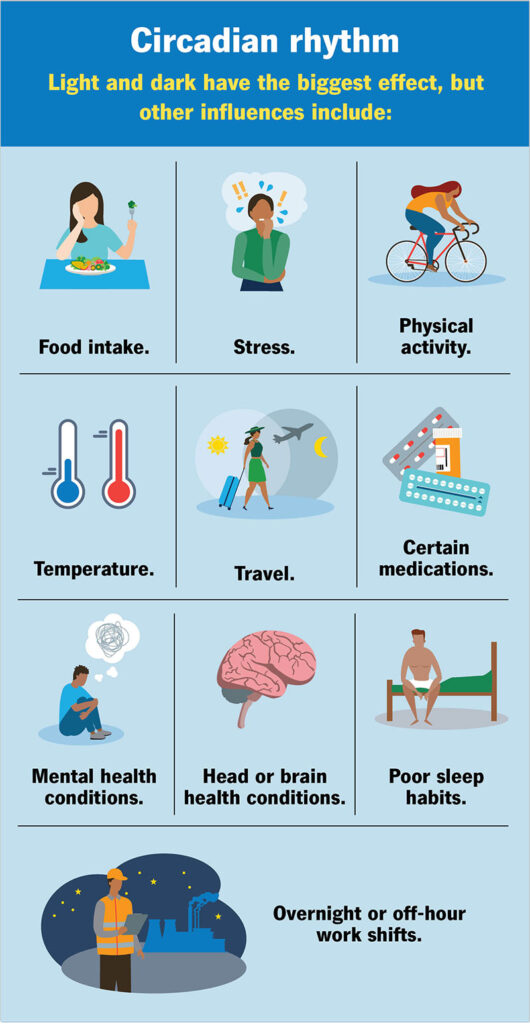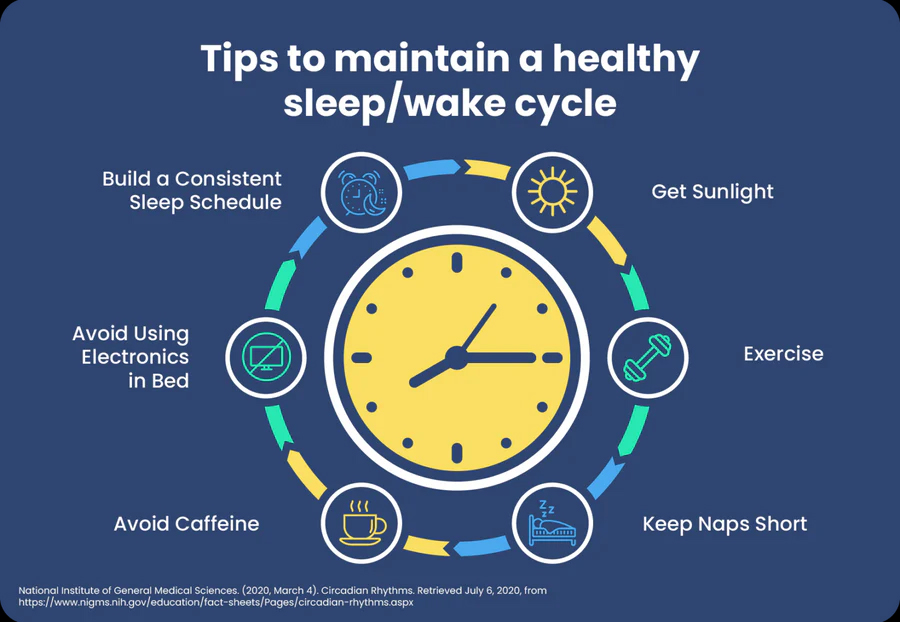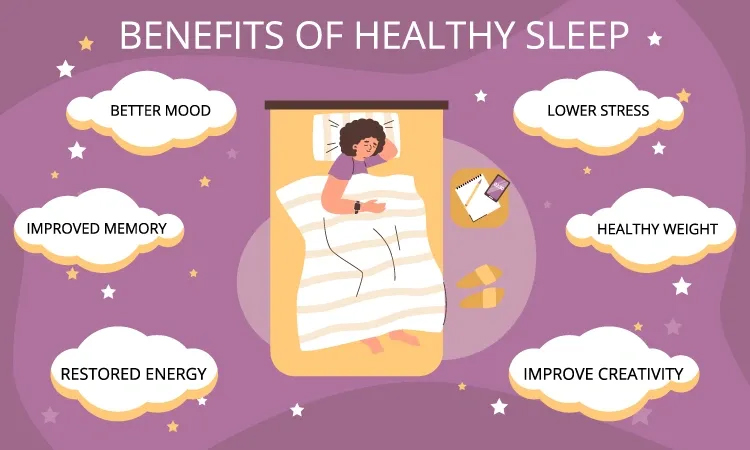
In today’s fast-paced world, where we’re constantly connected and juggling endless tasks, sleep often becomes the first thing we sacrifice. Late-night scrolling, tight deadlines, and stress have made restful nights feel like a luxury. But the truth is, good sleep isn’t a luxury—it’s a necessity. Sleep is the foundation of a healthy, balanced life, influencing everything from our mood and energy levels to our immunity and emotional well-being.
When we sleep, the body repairs itself and the mind resets. This quiet, natural process restores our strength, supports mental clarity, and keeps our emotions stable. Without quality sleep, even the healthiest diets and active lifestyles can’t compensate for the fatigue, brain fog, and irritability that follow. To truly live well, we must learn to respect and protect our rest.
The Science of Sleep: Your Body’s Natural Rhythm
Sleep is more than just shutting your eyes; it’s a sophisticated biological process. Our body follows a natural internal clock known as the circadian rhythm, which controls when we feel awake and when we feel sleepy. When we go to bed and wake up at consistent times, this rhythm stays balanced—helping us fall asleep easily and wake up refreshed.
Ignoring this rhythm can cause sleep disorders, hormonal imbalance, and fatigue. Developing good sleep rituals—like winding down at the same time every night and avoiding screens before bed—helps synchronize your body with its natural cycle, promoting deeper, more rejuvenating sleep.
Understanding Your Circadian Rhythm
Our body runs on an internal 24-hour clock known as the circadian rhythm, which regulates our sleep-wake cycle, body temperature, and even hormone release. This rhythm is influenced by light and darkness, helping our body know when it’s time to be alert and when it’s time to rest.
When you follow consistent sleep rituals-like going to bed and waking up at the same time every day-you help synchronize your circadian rhythm, making it easier to fall asleep naturally and wake up refreshed.
Disrupting this natural rhythm, such as staying up late, using bright screens before bed, or changing your sleep schedule frequently, can confuse your body’s clock. Over time, this can lead to fatigue, poor concentration, weakened immunity, and mood swings.
To maintain a healthy circadian rhythm, try to expose yourself to natural sunlight during the day, avoid caffeine or heavy meals close to bedtime, and create a calming nighttime environment.
When your circadian rhythm is balanced, your sleep quality improves dramatically, helping your body repair, rejuvenate, and perform better-both physically and mentally. Remember, healthy sleep isn’t just about the number of hours; it’s about sleeping in harmony with your body’s natural rhythm.

How Sleep Shapes Mental and Physical Health
A full night of rest impacts both mind and body. During sleep, the brain organizes information, processes emotions, and clears out toxins that build up throughout the day. That’s why lack of sleep can make you forgetful, anxious, or less focused.
Physically, sleep helps muscles recover, boosts immunity, and balances hormones. It even supports weight management and heart health. Studies show that people who enjoy healthy sleep patterns are more energetic, emotionally resilient, and productive. Good sleep is a powerful, natural medicine that costs nothing—only your time and discipline.
Building Healthy Sleep Rituals
The secret to better sleep lies in the small things you do before bedtime. These are your sleep rituals, simple habits that prepare your body and mind for rest. Try to keep a consistent bedtime, even on weekends. Spend the last hour before bed away from screens; blue light from devices can suppress melatonin, the hormone responsible for sleep.
Create a calming evening routine: take a warm shower, read a few pages of a book, or practice gentle breathing exercises. Dim the lights, sip herbal tea, and reflect on the day with gratitude. Over time, these rituals will signal your body that it’s time to unwind, helping you fall asleep naturally and peacefully.
The Perfect Sleep Environment
Your bedroom plays a major role in your sleep quality. Keep it cool, quiet, and comfortable. A dark room helps your body produce melatonin, while a clean, clutter-free space promotes relaxation. Soft bedding, fresh air, and soothing aromas like lavender can further enhance the sense of calm.
Reserve your bed only for sleep and rest—avoid working, eating, or scrolling through your phone while lying down. This helps your brain associate your bed with relaxation rather than stress or distraction. Make your room a true retreat where rest and peace naturally take over.

Lifestyle Choices That Improve Sleep
Healthy sleep doesn’t just depend on your nighttime habits; it’s shaped by how you live your day. Regular exercise, a balanced diet, and proper stress management all contribute to better rest. Physical activity improves sleep quality by reducing tension and balancing hormones. However, try to avoid intense workouts close to bedtime, as they may make you too alert.
What you eat also matters. Avoid caffeine, nicotine, and heavy meals before bed. Instead, choose light dinners and calming drinks like chamomile or warm milk. Stay hydrated, but don’t drink too much right before bed to avoid frequent awakenings.
Emotional Wellness and Restful Sleep
A peaceful mind is the gateway to peaceful sleep. Stress and anxiety often keep people awake at night, making relaxation difficult. To counter this, adopt calming practices like journaling, meditation, or deep breathing before bedtime. Writing down your worries or focusing on gratitude can help clear your thoughts and prepare your mind for rest.
Remember, your emotional state during the day directly affects your sleep at night. Prioritize positivity, spend time outdoors, and maintain meaningful social connections—all of which help regulate mood and promote better rest.

The Transformative Benefits of Good Sleep
Following good sleep rituals can transform your life in ways you might not expect. You’ll wake up feeling energetic, focused, and emotionally balanced. Your mood improves, your immunity strengthens, and your creativity flourishes. Over time, you’ll notice brighter skin, sharper thinking, and a renewed zest for life.
Good sleep gives your body the time it needs to heal and rejuvenate, allowing you to perform better in every area—professionally, mentally, and physically. It’s the invisible foundation of true wellness.
Rest as a Form of Self-Love
In a society that glorifies constant productivity, sleep is the ultimate act of self-love. Taking time to rest doesn’t mean you’re being lazy—it means you value your well-being. Sleep allows your mind and body to recover so you can give your best each day.
So tonight, set your phone aside, dim the lights, and let yourself unwind. Allow your thoughts to slow, your body to relax, and your breath to soften. Because real wellness doesn’t come from doing more—it comes from knowing when to pause. And that pause begins with one essential habit: a good night’s sleep.
